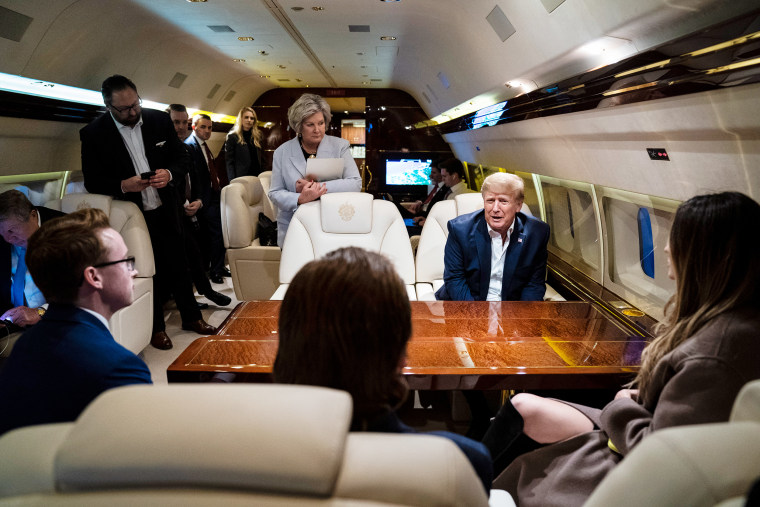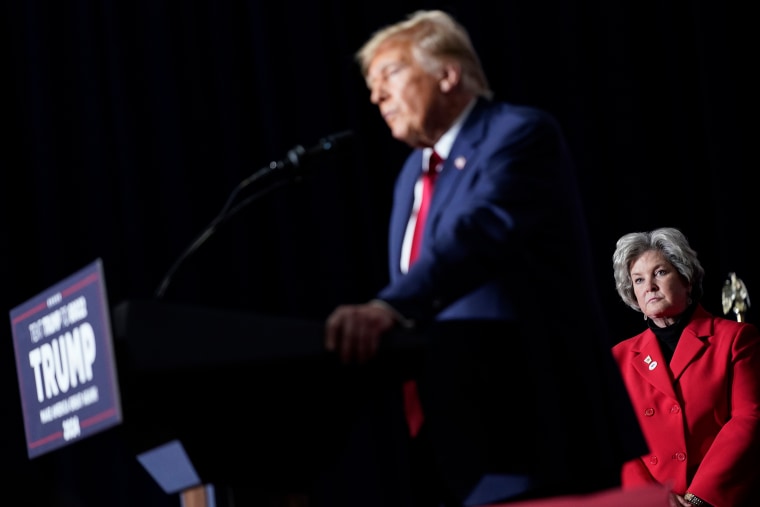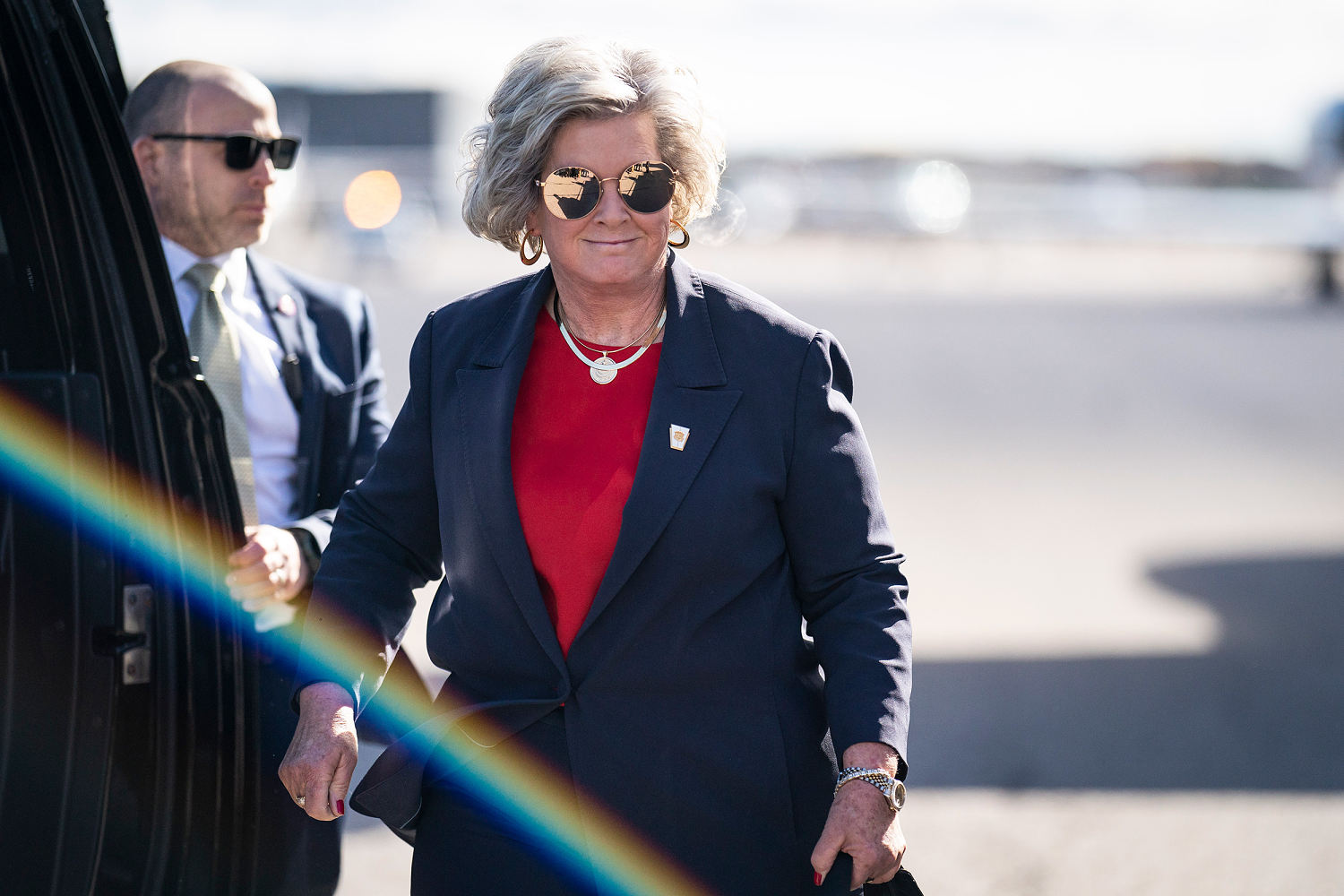The first time Donald Trump cold-called Susie Wiles, she didn’t pick up.
It was 2015, and Trump was looking for a political guide to help him topple two of Florida’s favorite sons — former Gov. Jeb Bush and Sen. Marco Rubio — in the state’s delegate-rich, narrative-setting Republican presidential primary.
Wiles, who played a similar role in Rick Scott’s successful outsider bid for governor in 2010, didn’t recognize Trump’s number when it popped up on her phone. He kept ringing, and eventually she answered.
“I’m told you know something about Florida,” Trump said. “Is that true?”
After a visit to Trump Tower in New York City, followed by a lengthy period of silence, Trump offered — and Wiles accepted — a post as co-chair of his campaign in the state.
Since then, he has fired her, re-hired her and made her arguably the most powerful aide in Republican politics.
Now, Trump is storming through the Republican presidential primary campaign with Wiles, his de facto national campaign manager, applying a cool temperament to the political fires — often self-started — that surround and threaten to consume him.
Wiles’ low-drama approach, forged over more than 40 years serving Republicans at every level from mayor to president, acts as a crucial counterbalance to a volatile candidate who is trying to win the White House while fighting four criminal indictments, according to GOP sources inside and outside Trump’s camp.
“The only flamboyant person in the Trump campaign these days is Trump,” said Richard Porter, a member of the Republican National Committee from Illinois, who praised Wiles for running a “tight operation” out of Palm Beach, Florida. “He’s figured this thing out in a way that’s encouraging for a person that’s not in Trump world.”
This portrait of the woman Trump has entrusted with running his presidential campaign staff is drawn from interviews with a dozen Republicans, including Wiles, most of whom are close to Trump. Her task — helping return a defeated, twice-impeached former president facing four indictments to the White House — is unlike any other faced by an American political operative.
Skeptics note that Wiles has never run anything with the scope or stakes of this undertaking, that the campaign has been spending more than it raises and that Trump’s primary victories more closely resemble those of a prohibitive favorite than a world-beater.
And yet, with Wiles at his side, Trump heads into next week’s Super Tuesday contests carrying commanding leads in delegates and most public polling of coming primary contests. Surveys indicate he will start the general election on relatively even footing with President Joe Biden.
Wiles, the daughter of legendary NFL play-by-play man Pat Summerall, has battled through adversity before. She told her father, in a letter delivered by friends at an alcohol intervention in the early 1990s, that his public behavior made her ashamed to share his name. Summerall, who would later say her note cut the deepest, got sober.
As a young aide in the Reagan administration, Wiles was personal secretary to Labor Secretary Raymond Donovan when he was investigated for alleged mob ties. Donovan, who resigned after a special prosecutor declined to bring charges and before he was acquitted in a New York trial, famously asked which office he could visit to “get my reputation back.”
And in a fateful set of moves that preceded Trump’s bringing Wiles back into his fold, Florida Gov. Ron DeSantis ousted her from his camp, persuaded Trump to sack her and tried to blacklist her in GOP circles.
If there is a personality trait that links Trump to the soft-spoken, media-shy Wiles, it’s that survive-and-thrive drive: Trump feeds his by disrupting order; Wiles feeds hers by maintaining order. Many Republicans credit Trump’s political comeback at least in part to her bringing a new sense of discipline and direction to his campaign.
Wiles isn’t one of them.
In a rare on-the-record interview the day after Trump romped to victory over Nikki Haley in South Carolina, the platinum-bobbed and blue-eyed Wiles, 66, said his success so far is attributable to precisely one person: “President Trump.”
She said his natural political skills — “determination” and being a “student of people” and a “good reader of sentiment” — have been coupled with invaluable experience gained over eight years in the political and policy arenas.
“He’s now more knowledgeable about what it takes to be president after his first term. He’s more knowledgeable about how to interact with the media. His personnel instincts are, I think, better honed,” Wiles said in a 30-minute phone call. “The new skills are inside the package of the same Donald Trump, and I think that’s what’s making the difference this time.”
‘You gotta trust me on this one’
There’s no doubt that Trump rises and falls on his own.
A singular figure in American political history, he seized hold of the Republican Party’s political base during the 2016 election and hasn’t let go. There was no Wizard of Oz staffer standing behind the curtain when Trump fashioned indictments into trampolines and bounded past DeSantis, Haley and the rest of the Republican field.
He has burned through so many campaign managers and chiefs of staff — no fewer than 10 — that it’s hard to remember them all. Most had egos big enough to believe they could manage Trump, as well as their own agendas.
Wiles is just trying to manage his staff to best serve him, according to several people who work closely with her, including Trump’s eldest son.
“She’s purely focused on doing whatever she can for my father,” Donald Trump Jr. said in a statement. “It’s not about making money, it’s not about getting press, it’s not about getting credit, it’s about doing everything she can to fight for my dad.”
Wiles “always puts his best interest ahead of everything else, which is something I certainly can’t say about most political operatives that I’ve met,” Trump Jr. added. The campaign declined to make the former president available for an interview.

Because the person at the top isn’t distracted with her own priorities or delusions of becoming the first person to tame Trump, it’s easy for the rest of the staff to concentrate on the mission of electing him, said a senior campaign official who spoke on the condition of anonymity to discuss their boss.
“When the leader with all the power doesn’t bring their own agenda to the fight, it becomes real challenging to bring your own,” the campaign official said.
Trump allies and critics alike note that this campaign has functioned more fluidly than his first two. They point in particular to a push for early endorsements that far outstripped similar efforts by Trump’s rivals, the campaign’s mastery of delegate-selection rules, and organized ground efforts that left nothing to chance in the first five states on the calendar — all of which Trump won handily while peppering his barnstorming schedule with court appearances.
Trump’s past campaigns and White House teams have been studies in power struggles and personality clashes, both in terms of internal warfare and of outsiders fighting with insiders for Trump’s ear. As he moves toward claiming the nomination, and possibly the presidency, a diverse array of interests will jockey for his attention and favor, creating complications for his top aide.
“She sits in a tough chair,” Bill Stepien, who managed Trump’s 2020 campaign, said with knowing sympathy.
Wiles and veteran operatives Chris LaCivita and Jason Miller, who all hold the title “senior adviser,” focus on controlling what they can control: the blocking and tackling of the campaign. They all seem to understand that no one is really a Trump-whisperer and that anyone with the title “campaign manager” will be the first to be sent packing if Trump grows dissatisfied.
“One of Susie’s greatest strengths is that she truly understands what President Trump is looking for in a campaign operation,” said Miller, who is working on his third Trump campaign. “She’s able to put his plan into effect, and I think some people who have previously worked for the president have tried to get him to conform to their way of doing things, where Susie’s approach is that he gives direction and then she’s going to come up with smart strategy and the right people to help accomplish that.”
Wiles said she doesn’t anticipate Trump’s naming a campaign manager for the general election, but there’s no question she’s in charge at the staff level.
“Everyone has a role, and it all goes back to Susie. She is the most well-organized political operative I have ever worked with,” said Rep. Matt Gaetz of Florida, who has collaborated with Wiles on several campaigns, including DeSantis’ 2018 bid for governor. “She does not operate in a pyramid system. She is the center, and everyone else is a spoke.”
Trump consults her on everything from political strategy to decorations in his airplane and his recent brainstorm about a line of self-branded sneakers. Wiles offers opinions, sometimes pushing back gently, but doesn’t substitute her judgment for his.
She thought the release of the Trump kicks at an athletic-shoe convention, in the middle of a presidential election, would be a disaster.
“Are you sure you want to do this?” she recalled asking him as he prepared to hawk glitzy gold $399-a-pair “Never Surrender” high tops at Sneaker Con in Philadelphia in mid-February.
“Yes, I do,” said Trump, who was greeted with a mixture of cheers and jeers at the convention. “You gotta trust me on this one.”
One thousand pairs of the limited-edition shoes sold out in a matter of hours.
Brad Todd, a Republican consultant who has known Wiles since they worked on a bond referendum in Jacksonville, Florida, two decades ago and again on Scott’s campaign, said her unique attribute is that she is “relentlessly collected” in an arena that tends to focus on the latest crisis.
“She’s never ruffled, she never panics, she keeps her eyes well down the track,” Todd said. “Campaigns often have a tyranny of the urgent, and that often derails even good campaigns. She does an exceptional job of not falling prey to the tyranny of the urgent.”
‘An ax to grind’
If revenge is a dish best served cold, DeSantis is buried under an avalanche of frozen pudding.
During a recent catch-up call with supporters from his defunct presidential campaign, DeSantis was asked about the effects of Trump’s brutally negative campaign against him — which included a super PAC ad that made fun of him for once having eaten pudding with his fingers in front of aides.
He singled out Wiles, though not by name, for his woes.
“I think he’s got people in his inner circle who were part of our orbit years ago that we fired, and I think some of that is they just have an ax to grind,” DeSantis said.
The nasty professional break-up of DeSantis and Wiles in 2019 stunned many Republicans because of the integral role she played in electing him.
Friends of mine from the old days scratch their heads, but I don’t care.
Susie Wiles
Wiles agreed to step into DeSantis’ 2018 campaign for governor a month or so before that year’s election as he teetered on the brink of defeat at the hands of Democrat Andrew Gillum.
“I fired myself,” joked Gaetz, who was the DeSantis campaign’s top adviser until Wiles was hired. “I replaced myself with Susie Wiles.”
Trump’s endorsement had been the key factor in DeSantis’ pulling off an upset primary win that year, but when Trump appeared at a campaign rally for DeSantis in late October, he made sure to heap credit on Wiles for the work she was doing in the general election.
Trump walked into a holding room before the rally, looked at DeSantis, pointed to Wiles and said, “Smartest thing you’ve ever done.”
DeSantis would go on to win by a little more than 34,000 of the 8 million votes cast — a margin close enough to trigger a recount.
DeSantis isn’t known for his gratitude — it’s easier to count the number of advisers who have been cast out of his inner circle than the number who remain — and if he felt any toward Wiles, it evaporated quickly. By the spring of 2019, she had been dismissed from his team amid claims that she was using her influence to place allies in jobs and serve her lobbying clients.
“It had a lot to do with the battle between her and Shane Strum,” who was DeSantis’ first chief of staff, said a longtime DeSantis adviser. “He was new in the orbit and trying to establish himself as the alpha dog in that community.”
Strum didn’t answer a call seeking comment.
But DeSantis and his advisers weren’t satisfied with ousting Wiles. Convinced that she was the source of leaked documents indicating that DeSantis was selling access to lobbyists and donors, DeSantis successfully pressured Trump to fire her in September 2019. On the same day, Wiles announced that she was leaving the lobbying firm Ballard Partners because of health issues.
A longtime ally described the whisper campaign against Wiles as “lies” and DeSantis’ vindictiveness as “beyond the pale.”
By the summer of 2020, as he lagged Biden in polls in Florida, Trump turned his attention to Wiles. He wanted her back and called DeSantis from the Oval Office to say he was planning to hire her. DeSantis was insistent that she remain on the sidelines.
“He raised questions about her trustworthiness. He raised questions about her competency,” a person familiar with the discussion said. And, this person said, DeSantis suggested that “he might not be as personally engaged” in Trump’s re-election effort in Florida if Wiles were hired to run it.
Trump decided he had deferred to DeSantis for long enough and tapped Wiles to reprise her role from 2016. He won Florida again, even as he lost the presidency.
“He made the right decision,” said Stepien, the 2020 Trump campaign manager. “I worried a lot less about Florida after Susie Wiles was hired.”
Shortly after he left office in 2021, Trump picked Wiles to run his post-presidential political operation. That put her in charge of fundraising, vetting candidates who wanted Trump’s endorsement in the 2022 midterms and just about everything else.
But the most important project, as it became clear that DeSantis would run for president, was dispatching the governor, who fancied himself a more polished and more essentially conservative version of Trump. Wiles said she didn’t have to provide any guidance to Trump about how to draw contrasts with DeSantis or get under his skin.
“He’s a far keener reader of people than I am,” she said. “I didn’t need to do that.”
DeSantis endorsed Trump as he dropped out of the race before the New Hampshire primary in January, but his remarks on the February donor call suggest he hasn’t let go of his grudge against Wiles.
Gaetz, who has known both Wiles and DeSantis for years, says only one lives rent-free in the other’s head.
“Ron DeSantis thinks about Susie Wiles way more than Susie Wiles thinks about Ron DeSantis,” he said.
Wiles is flummoxed by the fixation.
“I don’t understand why, so many years later, a governor, particularly of his stature, even cares about any kind of staff member. It just doesn’t make a bit of sense to me,” she said. “It didn’t change my opinion of him.”
Unprecedented challenges
With the primary campaign starting to fade in the rearview mirror, Wiles’ challenge is to scale up Trump’s operation for a national campaign at a time when he has had trouble raising money and much of his cash has been directed to legal bills.
Like most general election presidential campaign managers, Wiles has never done this before — and there are skeptics in Trump’s orbit.
A former Trump campaign official, speaking on the condition of anonymity to avoid angering him and Wiles, pointed to Trump’s cash crunch as a reason to doubt Wiles’ effectiveness. This person said Wiles is capable in state-level races and presidential primaries, in which close relationships with outside power players matter more than they do in a full-scale national campaign for the White House.
“I like Susie, but she’s in over her head,” this former official said.
That, of course, remains to be seen. One key will be the ease or difficulty with which the Republican National Committee is effectively subsumed into the Trump campaign. Through joint fundraising agreements, the party committee has the ability to raise exponentially more money from individual donors than the campaign can under federal law.
Trump has named North Carolina GOP Chair Michael Whatley and Lara Trump, the wife of his son Eric, as his picks for co-chairmanships of the committee. LaCivita will take on a role as the de facto chief operating officer of the RNC while retaining his position as a senior adviser to Trump, said Wiles, who describes their relationship as splitting up the duties of a traditional campaign manager.
“While he may be physically at the RNC, I think his brain will still be at the campaign, and I don’t intend to take a completely hands-off role at the RNC, either,” she said. “We’re doing it all together.”

The ritual integration of a nominee’s campaign and the national party committee is usually a little bumpy, but it’s nothing compared to the complications of running a presidential bid alongside a legal defense. Not only does Wiles have to worry about the candidate’s time, but there’s also a chance she could be called to testify in Trump’s trial on charges that he retained classified documents from his time in the White House.
After special counsel Jack Smith charged Trump in that case last year, ABC News reported that Wiles was the unnamed person in the indictment whom Trump allegedly showed a classified map of an unidentified country. Around the same time, CNN reported that Wiles had met repeatedly with federal investigators, which a source familiar with the situation confirmed to NBC News.
Wiles may be asked, or compelled, to appear in a witness box, a possibility that she declined to address.
Wiles, who described the confluence of election and court dates as a “scheduling nightmare” earlier in the campaign, said Trump’s legal and political strategies aren’t at odds with each other.
“If they conflict, it’s only on a calendar,” she said.
“We’re going to see that he will find time for everything he needs to do, which I know is not what anybody on the other side intended,” she said, lightly echoing Trump’s charge that he is the victim of politically motivated prosecutions. “They clearly intended to tie up so much of the important campaigning time that he would not be able to campaign, and that is not what has happened.”
‘Not an ideologue’
Wiles is an odd fit for Trump’s “Make America Great Again” movement. She is such a product of the Republican establishment that it’s hard to discern any particular philosophical bent.
Her first job in politics was with then-Rep. Jack Kemp of New York, who had played in the NFL at the same time as her father and shared a broadcast booth with him. She worked in Ronald Reagan’s White House and Labor Department, for Vice President Dan Quayle, briefly as the presidential campaign manager for former Utah Gov. Jon Huntsman’s ill-fated 2012 presidential primary bid and for three GOP mayors of Jacksonville, Florida, among others.
“She’s not an ideologue,” said Todd, who noted that the bond referendum for a “Better Jacksonville” created the funding mechanism for public projects, including a courthouse and a minor-league baseball stadium, that might not have been politically palatable if taxpayers were forced to foot the bill. “She enjoys succeeding in places where people think you can’t succeed.”
Becoming the top aide to a former president trying to make a comeback after his attempt to overturn his loss culminated in supporters’ beating cops and vandalizing the Capitol might qualify as such an assignment.
Roughly half the country thinks she’s working for a criminal and wants her to fail.
When Trump first called Wiles in 2015, she said, she was drawn to the idea of disrupting the status quo — even though she’d been part of establishing it.
“Friends of mine from the old days scratch their heads, but I don’t care,” she said. “I am quite sure that we are on a mission, and we’re going to complete it.”
Trump boasts to others that Wiles won Florida twice for him — “hyperbolic on his part,” she carefully notes — and did so without election irregularities. For now, he seems pleased with his campaign team, having praised Wiles and LaCivita the night of his Iowa caucus victory in January.
“They want no accolades,” Trump said at his party in Des Moines. “They just want a victory.”
But Wiles has been through enough to know fortunes and favor can change.
“When you’re winning,” she said, “it’s easy to like people.”
Source: | This article originally belongs to Nbcnews.com









